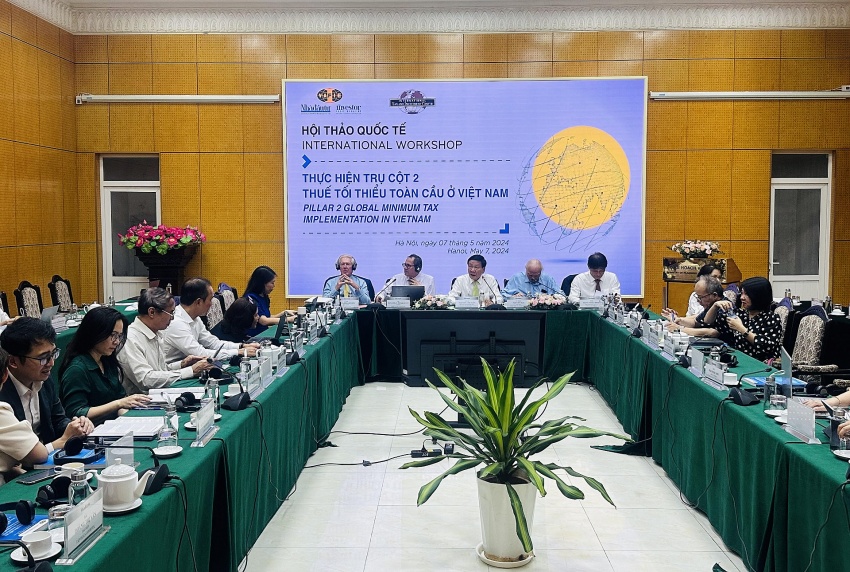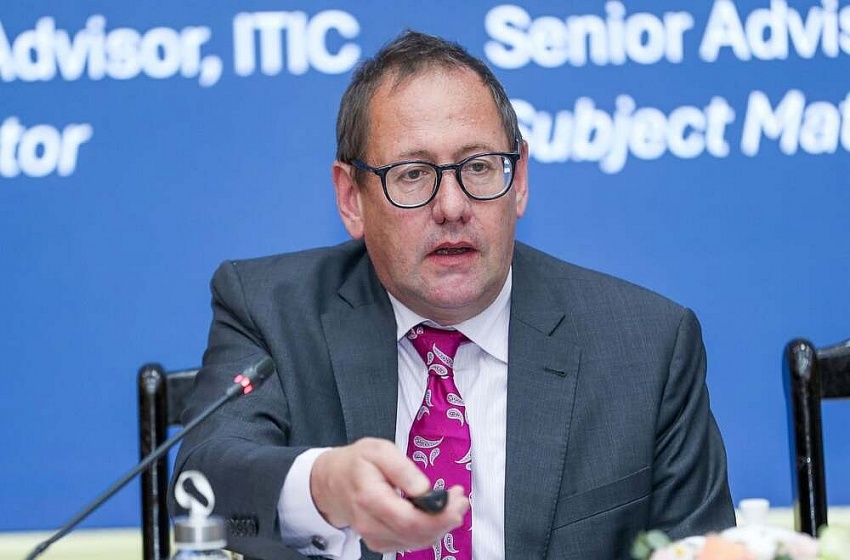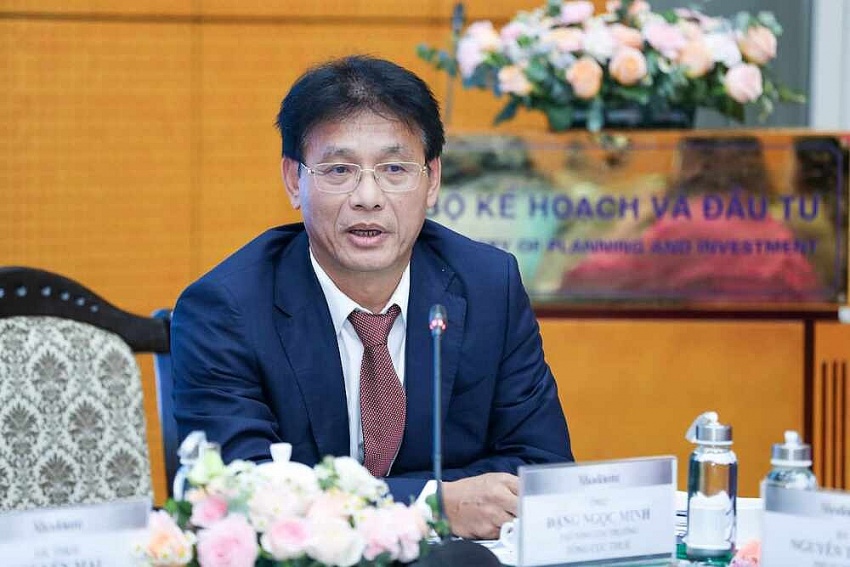Calculation of top-up payable under Pillar 2 global minimum tax
 |
| International workshop themed "Pillar 2 Global Minimum Tax Implementation in Vietnam" |
The event featured Wayne Barford, ITIC senior advisor, and former assistant commissioner of the Australian Taxation Office (ATO); Jonathan Pemberton, ITIC senior advisor, a former senior official of the Organization for Economic Co-operation and Development (OECD), and His Majesty's Revenue and Customs (HMRC) of the United Kingdom. ITIC is an independent, non-profit research and education organization.
The Vietnamese side was represented by Nguyen Mai, chairman of VAFIE; Phan Duc Hieu, a standing member of the Economic Committee under the National Assembly; Nguyen Thi Yen, vice head of the Finance and Budget Committee under the National Assembly; Dang Ngoc Minh, deputy general director of the General Department of Taxation; and other representatives from ministries, agencies, and corporations.
Jonathan Pemberton, senior advisor of the ITIC and former OECD official, said that Pillar 2 is implemented in domestic law, rather than by way of an international treaty, with one exception. The subject-to-tax rule is treaty-based and allows developing countries to ask other inclusive framework members to amend their tax treaties to enable source countries to tax certain “base-eroding” payments if they are subject to a low-rate (less than 9 per cent) in the hands of the recipient (resident countries).
 |
| Jonathan Pemberton, senior advisor of the ITIC and former OECD official |
In the principal elements of the Global Anti-base Erosion (GloBE) rules, payment of the top-up tax is guaranteed by three interlocking rules, including the Income Inclusion Rule (IIR); the Qualified Domestic Minimum Top-up Tax (QDMTT); and the Undertaxed Profits Rule (UTPR).
Of these, the IIR operates similarly to controlled foreign company regimes – the ultimate parent entity pays if it has subsidiaries that pay low (less than 15 per cent ETR) taxes in their jurisdictions. The QDMTT enables countries to incorporate the minimum 15 per cent tax rate into their tax regimes – it makes no sense not to if another country is going to impose the top-up tax anyway. The UTPR acts as a back-stop – it ensures that large multinational enterprises (MNEs) will pay the 15 per cent minimum tax, even if some members do not implement the GloBE rules.
All three rules use the same base for computation of the top-up tax payable in respect of each jurisdiction. The IIR is the starting point – the jurisdiction of the ultimate parent entity imposes the top-up tax on parents in respect of its low-tax subsidiaries, but the QDMTT paid in source countries is credited. So, source countries have priority if they introduce a QDMTT.
"There's a strong incentive to do so, as a top-up tax is likely to be collected elsewhere, so MNEs will have no net benefit from a low tax rate locally," Pemberton said.
The IIR is applied on a “top-down” basis – if the jurisdiction of UPE does not apply the IIR, jurisdictions of lower-level intermediate parents can do so, he added.
GloBE has achieved critical mass. 35 jurisdictions are implementing the rules to take effect in 2024. The OECD estimates that low-taxed profit will fall from 36 per cent of all profit globally to about 7 per cent, and aggregate tax revenues will increase by between $155-192 billion.
60 per cent of in-scope MNEs will be subject to the global minimum tax (GMT) under IIRs that take effect in 2024, and that number will increase to 90 per cent when UTPR takes effect in 2025. Developing economies implementing the rules are expected to increase corporate tax revenues by between 3.6 and 7.8 per cent.
 |
| Dang Ngoc Minh, deputy general director of the General Department of Taxation |
Dang Ngoc Minh, deputy general director of the General Department of Taxation, said that 122 foreign-invested corporations in Vietnam will be affected by the application of QDMTT, and the amount of tax that Vietnam will collect is estimated at about VND14.6 trillion ($608 million ), according to tax finalization data in 2022.
When applying the IIR for Vietnamese enterprises investing abroad, about six corporations will be impacted, and the amount of tax collected is estimated at about VND73 billion ($3 billion) (if residence countries do not apply QDMTT).
Minh emphasised, "The GMT is not an international treaty, not an international commitment, and is not required for countries to apply. However, if Vietnam does not apply, it still has to accept other countries applying the GMT, and has the right to collect additional taxes on businesses in Vietnam that are enjoying a tax rate lower than the global minimum rate of 15 per cent, especially foreign-invested enterprises."
The application of GMT regulations gives Vietnam new opportunities, such as increasing state budget revenue from additional tax revenue, strengthening international integration, and reducing tax evasion or avoidance, transfer pricing, and profit transfer.
"Amid this context, to ensure its legitimate rights and interests, Vietnam needs to affirm the application of the GMT," he affirmed.
In November 2023, Vietnam's National Assembly, the country's highest legislative body, issued a resolution on the application of a top-up tax under the Global Anti-Base Erosion Rules. Currently, the Ministry of Finance is developing a government decree to guide the implementation of the resolution.
The workshop is expected to contribute to the effective implementation of the GMT in Vietnam, which remains a new and complex issue.
 | New fund a solution to GMT concerns The Ministry of Planning and Investment has created a draft decree for a brand new investment support fund, but the scale of the projects and investors under the draft's purview is the subject of intense debate and discussion. |
 | Preferential support on cards for GMT alignment Green production and business, a favorable digital environment, high-quality human resources, and a suitable living environment are necessary factors for Vietnam in implementing the global minimum tax. |
 | Big foreign groups await GMT direction Foreign enterprises are expecting the early implementation of the government's new investment support fund so that they can boost investment in Vietnam amid the entry into force of the global minimum tax. |
 | Fund required to lower GMT impact While Vietnam's draft investment support fund is expected to benefit high-tech enterprises, those same groups have expressed concern over the conditions needed to take advantage. |
What the stars mean:
★ Poor ★ ★ Promising ★★★ Good ★★★★ Very good ★★★★★ Exceptional
Related Contents
Latest News
More News
- Masan Consumer names new deputy CEO to drive foods and beverages growth (February 23, 2026 | 20:52)
- Myriad risks ahead, but ones Vietnam can confront (February 20, 2026 | 15:02)
- Vietnam making the leap into AI and semiconductors (February 20, 2026 | 09:37)
- Funding must be activated for semiconductor success (February 20, 2026 | 09:20)
- Resilience as new benchmark for smarter infrastructure (February 19, 2026 | 20:35)
- A golden time to shine within ASEAN (February 19, 2026 | 20:22)
- Vietnam’s pivotal year for advancing sustainability (February 19, 2026 | 08:44)
- Strengthening the core role of industry and trade (February 19, 2026 | 08:35)
- Future orientations for healthcare improvements (February 19, 2026 | 08:29)
- Infrastructure orientations suitable for a new chapter (February 19, 2026 | 08:15)

 Tag:
Tag:

























 Mobile Version
Mobile Version